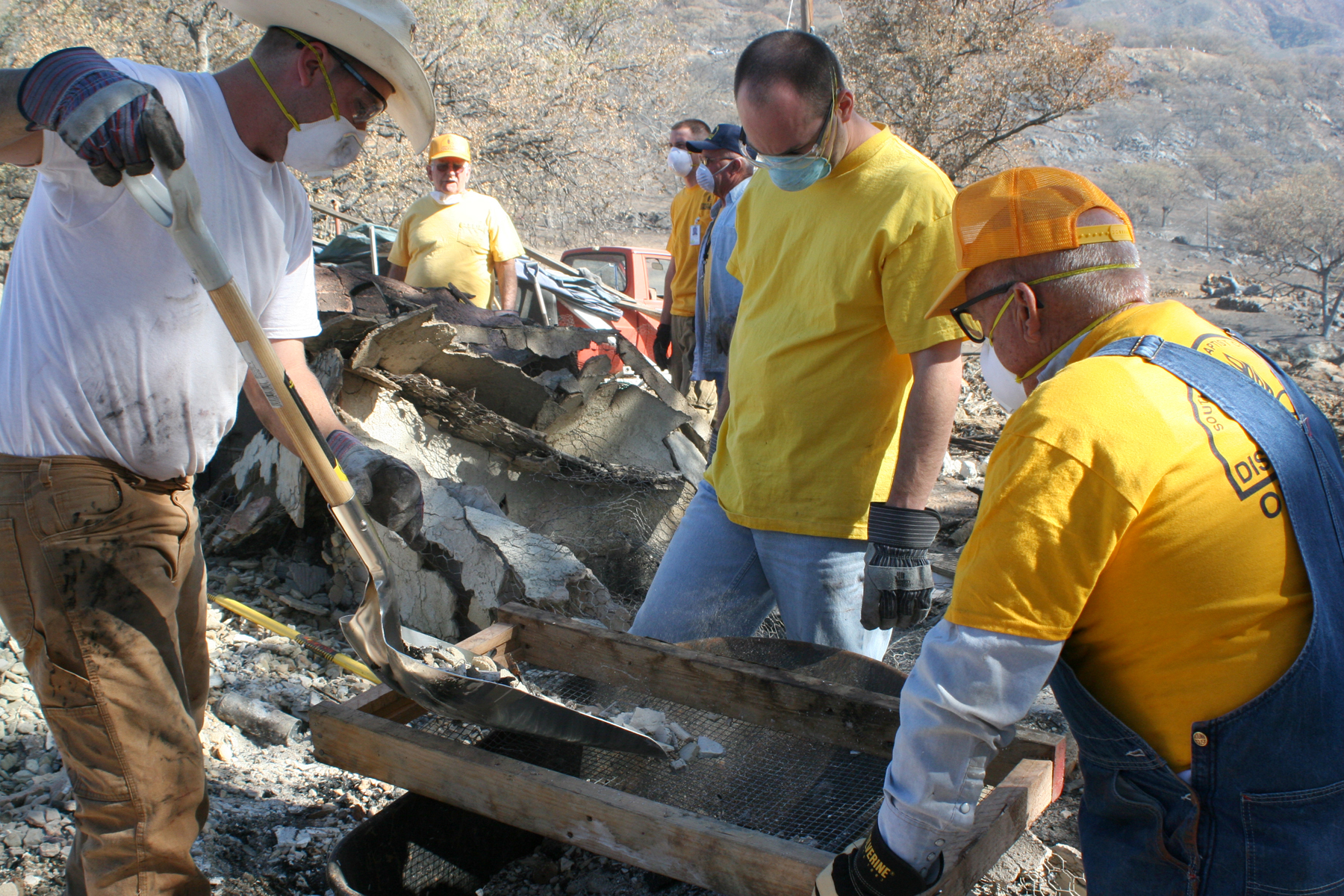
PAUMA VALLEY, Calif. (BP)–Melvin Nelson visited the home where he lived for more than 40 years on the La Jolla Indian Reservation on Monday, Nov. 5. As disaster relief volunteers cleared away piles of charred debris, Nelson seemed at first glance too upbeat to have lost his home two weeks ago in the wildfires that raged in Southern California. But between conversations, Nelson kept walking to the same spot on the edge of his property — under one of the few trees that survived the fires, where volunteers added to a pile of keepsakes rescued from the rubble: a collection of coins, small souvenirs and tools, jewelry, an old baseball.
“They just seem to mean so much to people, the things that we’re able to find and save,” said Peggy Williams, a Southern Baptist disaster relief leader from Banning, Ca, who has participated in several previous fire cleanup projects.
Nelson’s home was one of at least 40 homes on the reservation lost during the fires.
The reservation is the first location opened up for cleanup by Southern Baptist volunteers, said Don Hargis, who directs disaster relief for the California Southern Baptist Convention.
When local officials called Hargis to ask for help, he responded by mobilizing a team of more than 500 volunteers for Saturday, Nov. 3. But a high wind warning postponed the effort until a smaller team could gather at the reservation on Monday. Disaster relief volunteers from California and Oklahoma, along with Samaritan’s Purse volunteers from Florida, began cleanup on several homes in the area where the fire began on the reservation. By the end of the week, Hargis hopes to complete work on the 40 home sites.
“When you have this many people who don’t mind getting dirty and grungy to serve the Father, you can get a whole lot done,” he said.
Fred Nelson, who serves as tribal treasurer at the La Jolla Reservation, also visited Nelson’s home on Monday to watch the volunteers in action. Praising their quick response, Nelson noted that the La Jolla tribe was the first in California to put into place a “pre-mitigation plan” for disaster response. The reservation, which is home to 450 of the tribe’s 750 members, hadn’t been severely impacted by previous fires.
The reservation is one of many areas that will keep volunteers busy for months to come. In 2003’s Cedar and Paradise fires, disaster relief and partnering organizations cleaned up 600 homes over a period of six months. Because of the length of the cleanup process, many volunteers will come from around the country to serve for a week, a month or even longer.
Evanah Folkerson, who traveled with her husband from Oklahoma to help, said God called them to look outside their own community in the aftermath of the wildfires.
“Sometimes, this is what God has for us to do: to get out and help someone.”
Hargis added that volunteers have a momentous opportunity to share why they do what they do. During their lunch break on Monday, he encouraged the volunteers to share the motivation behind their actions.
“If you’re asked today why you’re doing this, let them know that, one day, God came into your life. And because He showed His love to you, you want to serve them.”
Over the previous two weeks, disaster relief volunteers have shown their hearts for service by preparing more than 170,000 meals for distribution at evacuation and fire assistance centers. Three kitchens (two at San Diego’s PetCo Park and one in Ramona, Ca.) will close this weekend as volunteers shift their focus to cleanup. Next, Hargis hopes to direct cleanup work toward Bear Mountain in San Bernadino County, where approximately 250 homes were lost.
Robert Ruise, a member of the La Jolla tribe whose home was spared, had watched the fire move across the valley and did what he could to help in the days following. As part of the tribe’s volunteer fire department, Ruise owns a water truck that he used to help save several homes in the area. On Monday, he brought the truck to the cleanup area to help control the dust that rose as volunteers sifted through the debris.
As he watched the volunteers work on Nelson’s home, Ruise talked about the reservation where his family has lived for decades. His voice held hope for a new beginning.
“It was beautiful, although you wouldn’t know it by the way it looks now. But things will be beautiful again. They always are.”
–30–
Meredith Day coordinates communications with the Vision San Diego outreach of the Southern Baptist North American Mission Board’s Strategic Focus Cities initiative. For more information on volunteering for disaster relief efforts in Southern California, contact Cathy Glover at the California Southern Baptist Convention, 559-229-9533, ext. 255, or [email protected].
















